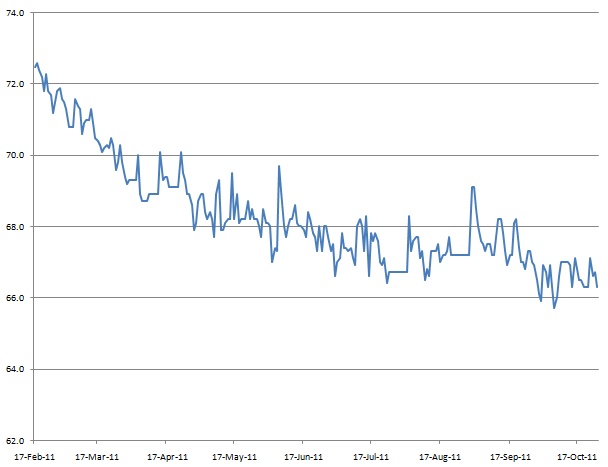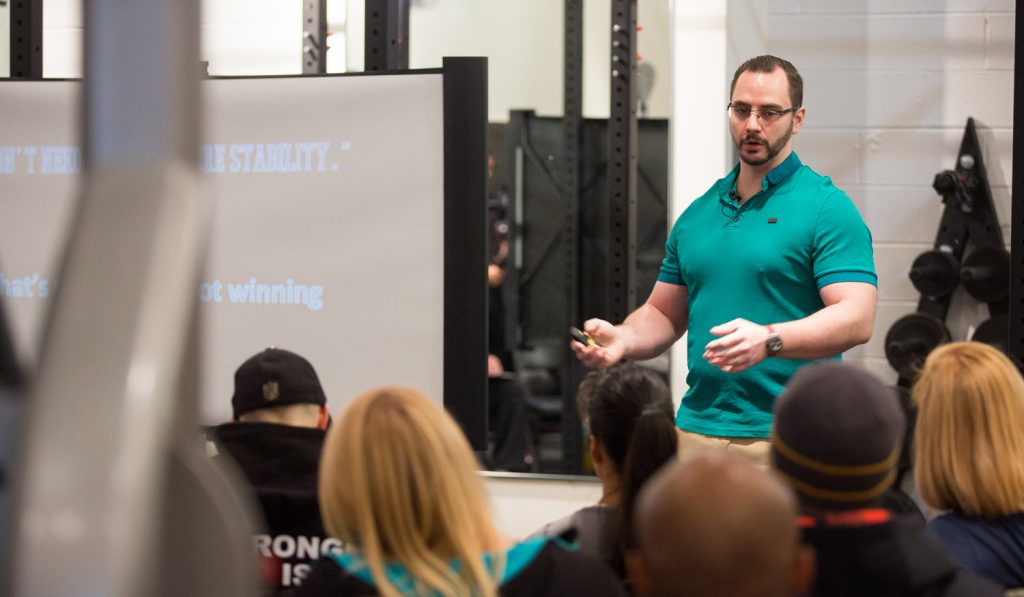Weight Loss Isn’t a Race
I hear it all the time.
A client who has made massive changes in their life by beginning an exercise program for the first time in years, changes in their dietary habits, and other lifestyle modifications all geared towards weight loss. They come in one day depressed because all of their hard work and changes resulted in no weight loss that week, and in some cases even weight gain.

They’re making massive changes to improve their health and wellness that will speak volumes in long-term personal growth and improvement, but focus on a short term measure of progress that’s incredibly variable. While we all like to see the numbers tick down, the outcome is the result of the consistent application of means (exercise, good nutrition, sleep, recovery), versus a cause and effect relationship.
Often weight loss is much like a stock market reading. A little up, a little down, but over time the trend should be moving in a beneficial direction. Unlike a stock though, you would want the trend to be down and not up. The big element to consider is that looking at daily or even weekly fluctuations can cause more stress than beneficial, especially if those readings would lead the person to value themselves hinging on the element of seeing beneficial change. Talk to a financial advisor and they’ll likely tell you the same thing about your stock portfolio.

A change like this equates to 6 kg (about 13 lbs) over a span of 9 months, or a rate of weight loss of 1.44 lbs per month. If you discuss with many trainers and non-certified fitness personalities, they would be quick to tell you a good rate of weight loss is 1-2 lbs per week, which means if this person were to value their efforts against that rate of weight loss, they may view their success as a failure.
Weight loss of any kind shouldn’t be considered as a goal to put a deadline on, or assign a rate to determine success. In many instances, this is the fastest way to ensure failure of a weight loss goal. There are obviously some exceptions, such as athletes who need to cut weight for a competition, and in those instances you can lose a significant amount of weight in a short period of time, but it’s incredibly temporary, with many athletes supercompensating within 24-48 hours of their weigh in and actually weighing MORE than when they started their cut. Not always, but it does happen. Similarly, many popular “cleanses” can cause you to lose weight rapidly, and just as rapidly gain that weight back once the cleanse is completed. It should be noted that much of the weight being lost is water weight, which can put you at significant risk of dehydration if not done carefully or monitored. Check out this article on Breaking Muscle to get some more info on it.
We can even look at the highly motivated and how they lose weight. Winners from the show The Biggest Loser have seen mixed results from their intense 24/7 system with the sole focus on weight lost. Some have regained all the weight back, and some have successfully maintained their weight loss, but the odds are similar to a coin flip. Check out this article to see the individuals success and challenges. A big criticism to making weight loss a challenge and something where people compete with each other is a very clear way of having people minimize the successes they do achieve. How many times did a contestant have a phenomenal weekly weigh in but look defeated because others had somewhat larger benefits?

In any other situation, a 4 lb weight loss in one single week would be a massive victory for anyone.
So let’s get back to why people would want to lose weight in the first place. Would it be to look good for a single picture or event and then know you’re going to gain the weight back? Or are you looking to live the next 10-30 years of your life with a lower body composition? If it’s the second option, does it really matter how many months it takes to get down to your goal weight, especially in the context that it’s consistently been shown that the faster you lose weight the greater the potential for rebound weight gain could be compared to a slower loss?
Let’s take a look at some of my clients who have managed long-term weight loss. They made simple changes to their lives – some small dietary alterations, began exercising regularly (nothing too terribly intense but just consistent), and then did that regularly, week in and week out for months and even years on end. a 1-2 lb per month weight loss that was easy to achieve without feeling like a diet or self-eroding workout plan leads to a 12-20 lb weight loss over the span of a year. That’s significant for anyone. Do that for 2-3 years and weight loss of a sizeable amount is simple and pretty successful, and makes it considerably easier to keep the weight off long term than constantly going hard and rebounding.
So how does a simple weight loss plan differ from a more involved and rapid plan? Essentially, the simple plan is more about finding small changes and summing their benefits versus doing a complete lifestyle 180 degree turn. Think about some of the things you could do without even thinking about them to help weight loss. Get a small latte instead of a medium or large. Get a salad with lunch instead of a sandwich or burger. Drink some water once or twice a day instead of a sweetened beverage. Walk a little more, or try to get in some daily activity that can burn a few calories.
Because weight loss has the ability to go up and down, use measurements as data points to give an idea of the overall trend of what’s happening. If you have an up day or a down day, enter them into a spread sheet and look at how the graph is changing. If there’s been no change over time, look at what you can do in your lifestyle to jump start it again, be it adding in a couple minutes of calorie burn per day or cutting out a sweet here or there. Once you notice weight loss start again, stay the course.
I’ll give an example that’s close to my own heart: Me. About 18 months ago, I weighed 264 lbs. This was the heaviest I’d been, and it coincided with the time I was filming Advanced Core Training. The combination of being busy, eating poorly, and finding excuses for why I couldn’t workout or eat properly way too often, lead to a slow and steady weight gain over the course of a couple of years.

Since then, I started a couple of very simple things. First, I downloaded MyFitnessPal on my iPhone and started tracking food intake. I didn’t change anything at first, just wrote in what I was eating to get a relatively honest idea of how many calories I was eating on a daily basis. The number was around 2800-3200 a day. I looked at the intake I was consistently eating and found a few ways to reduce overall intake without feeling hungry or stressed out, and managed to bring that down to around 2400 calories a day. This still involved the odd dessert and glass of wine or bourbon once in a while too.
Second, I started tracking my workout time each week, trying to get in 2-3 hours of cardio for calorie burn and 2 hours of strength work. That’s it. The exercises or intensity wasn’t something I was worried about, just the time spent in the activities. These small changes were applied week in week out for the past 6 months, regardless of whether weight loss happened or didn’t.
I’m down to 247 lbs as of yesterday, which is the lowest I’ve been in about 5 years. The process has been relatively easy, which is why it’s been successful.
It doesn’t have to be flashy, it just has to be consistent. There’s going to be times where weight goes up again, but staying the course is what will result in life-long changes. Short intense phases can occur as needed, but consistency over the span of decades should be the focus, not 30 day or 60 day challenges. Focus on the process and the outcome will be there.
Fast or slow, the goal is sustainable weight loss over the long haul, not something to lose and gain repeatedly year after year. If it’s simple and something you can do with minimal effort, the likelihood of staying with it for life is much higher than more involved or restricted programs. Find what you enjoy doing, make simple and effective changes in your lifestyle, and use scale measurements as data points over the span of longer timeframes, and weight loss can be easy, effective, and successful.
3 Responses to Weight Loss Isn’t a Race